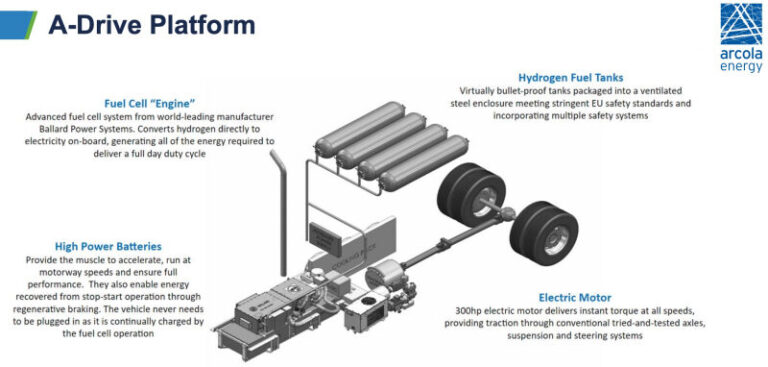Led by Arcola Energy, the Scottish Hydrogen Fuel Cell Freight Trial (SHyFT) has confirmed that it has secured funding from the Department for Transport’s zero-emission road freight program to develop a trial of hydrogen fuel cell trucks, supported by a green hydrogen refueling infrastructure.
Based in Scotland, the project will assess whether zero-emission fuel cell electric vehicles (FCEV) are a viable option for freight operators seeking to decarbonize operations in emission-sensitive sectors such as forestry and food and drink logistics. During the trials, SHyFT will utilize existing green hydrogen supply and refueling infrastructure within Scotland by incorporating long-distance routes.
For the trial, Arcola will integrate its own scalable fuel cell powertrain platform into a glider chassis, while Scottish Power and BOC will provide green hydrogen production, supply and refueling insights.
Arcola’s A-Drive technology platform is a production-ready hydrogen fuel cell powertrain platform that can be scaled and adapted to suit a variety of different heavy-duty vehicles and fleets. As a result, both development time and total cost can be reduced. The platform consists of a fuel cell, battery, hydrogen storage, power electronics, thermal management, motor and brakes. The size of each component can be specified to meet the power requirements of an array of vehicles.
With efficiency, reliability and durability a focus, the platform can also communicate data to drivers and fleet managers to reduce running costs over time.
Project partners include NewCold, which will provide a study on cold chain logistics, the Scottish Wholesale Association, the University of St Andrews, BOC and Scottish Power.
“The key objective of the project is to identify early adopters in heavy-duty freight sectors with a strong drive to decarbonize operations,” commented Richard Kemp-Harper, strategy director at Arcola Energy. “By understanding their use cases, we can specify vehicle and infrastructure requirements for what they need now, with a view to expanding capacity and capabilities in other sectors and vehicle types over time.”
Arcola will model and integrate early-adopter vehicle requirements into a trial concept design and vehicle development program. Following the outcome of the upcoming trial, a test fleet of 20-30 trucks may be used for a future study involving three existing refuelers, with the potential to add new installations during the trial. The project will also conduct a total cost of ownership (TCO) analysis, enabling operators to better understand and evaluate sustainability.
The Hydrogen Accelerator at the University of St Andrews will coordinate the study with the support of Arup.


